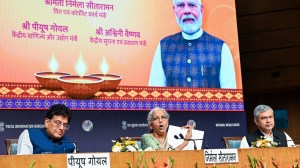Water the pitch for Musharraf’s one-day visit
Contrary to suggestions that cricket will serve as the main course when Pakistan President Pervez Musharraf comes calling on April 16, it is...

Contrary to suggestions that cricket will serve as the main course when Pakistan President Pervez Musharraf comes calling on April 16, it is water that will headline the menu. Specifically, the focus will be on resolving issues surrounding the 450 MW Baghlihar power project when Musharraf meets Prime Minister Manmohan Singh.
The issue came up for discussion when former Pakistan Prime Minister Chaudhary Shujaat Hussain called on Singh today in the lead-up to Musharraf’s visit. Islamabad has raised technical objections to the project in Doda district on the Chenab river that flows towards Akhnoor before entering Pakistan.
Pakistan’s central objection to the dam has been that it will involve storage and diversion of Chenab water, which it claims is a violation of the Indus Water Treaty.
Sources in the PMO said that Singh impressed upon the Pakistani delegation that the Baghlihar was purely a hydroelectric project without any ‘‘water storage’’ component and did not violate the Indus Treaty. He also assured his visitors that India would continue to honour the treaty.
With the latest deadline for the project being set for December 2005, India is keen that it takes off and eases the power shortage in Jammu and Kashmir. Pakistan has been in favour of appointing neutral observers from the World Bank to resolve the issue while India has been pushing for a bilateral solution.
Under the Indus Waters Treaty signed in 1960, the waters of the three eastern rivers (Beas, Ravi and Sutlej) were allocated to India and the western rivers (Chenab, Indus and Jhelum) to Pakistan for their unrestricted use.
The treaty also provided that both countries shall have use of the waters from each other’s rivers for four distinct purposes: domestic use, agriculture use, restricted use of hydroelectric power, through a “run-of-the river plant”, and non-consumptive use. However, both countries were prohibited from undertaking any “man made” obstruction to cause change in the volume of the daily water flow. The treaty barred India from storing any water of the western rivers, except to control floods.



- 01
- 02
- 03
- 04
- 05




























